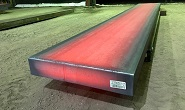Market Segment

March 4, 2021
Brazil's CSP Pushes Blast Furnace Outage to 2H 2021
Written by Michael Cowden
Companhia Siderúrgica do Pecém (CSP) has delayed a scheduled shutdown of its blast furnace until the second half of 2021, a company spokeswoman said.
The Brazilian steelmaker had originally planned to undertake the shutdown, necessary to implement “processes improvement,” in the second quarter of this year.
![]() “The initial date was postponed mainly due to the COVID-19 pandemic,” the CSP spokeswoman said.
“The initial date was postponed mainly due to the COVID-19 pandemic,” the CSP spokeswoman said.
Brazil has seen a steep rise in COVID-19 cases in recent weeks, according to figures from the Johns Hopkins University Coronavirus Resource Center. The U.S., in contrast, has seen cases fall sharply–although it’s not clear whether that downward trend will continue.
The CSP spokeswoman declined to say whether the changed maintenance schedule might affect slab shipments to North America.
“The production planning for 2021 is similar to the 2020 one, of approximately 2.8 million tons,” she said.
CSP began producing steel slabs in 2016 and has capacity of 3 million tons of slabs per year, according to the company’s website.
It makes a range of slabs including American Petroleum Institute (API) grade material used in the energy sector and peritectic steels necessary for certain defense and automotive applications.
CSP is a joint venture between Brazilian iron ore miner Vale, which holds a 50% stake in the company, and South Korean steelmakers Dongkuk and Posco. Dongkuk, the world’s largest slab buyer, holds a 30% stake and Posco a 20% share, per CSP’s website.
Brazil is also the largest slab supplier to the United States. The U.S. imported 2.42 million metric tonnes from Brazil in 2020, up 15.2% from 2.10 million in 2019, according to Commerce Department figures.
Mexico, the second biggest slab supplier to the U.S., shipped less than half that amount, 713,902.60 tonnes, to its northern neighbor last year.
Russia was a distant third with 98,064.10 tonnes of slabs sent to the U.S. in 2020.
Brazil is subject to a Section 232 quota rather than the 25% tariff that applies to Russian steel. And that makes its slabs more attractive to U.S. buyers.
Section 232 measures were lifted from Mexico in 2019 following successful talks that led to the U.S-Mexico-Canada Agreement (USMCA) replacing the North American Free Trade Agreement (NAFTA).
Slabs are important to keep tabs on because they are the raw material needed to make flat-rolled steel for U.S. re-rollers such California Steel Industries (CSI), Evraz North America, NLMK USA’s Pennsylvania operations, and AM/NS Calvert, a joint venture between ArcelorMittal and Japan’s Nippon Steel.
By Michael Cowden, Michael@SteelMarketUpdate.com







